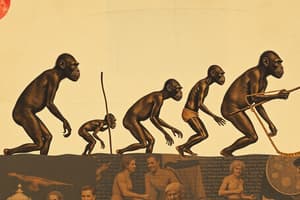Podcast
Questions and Answers
Which subdiscipline of anthropology focuses on the biological aspects of humans?
Which subdiscipline of anthropology focuses on the biological aspects of humans?
- Cultural anthropology
- Archaeological anthropology
- Biological anthropology (correct)
- Linguistic anthropology
What is the primary focus of foraging societies?
What is the primary focus of foraging societies?
- Domestication of animals
- Farming with machinery
- Hunting and gathering (correct)
- Cultivating plants
In which societal type do individuals primarily rely on herding animals?
In which societal type do individuals primarily rely on herding animals?
- Foraging society
- Horticultural society
- Agricultural society
- Pastoral society (correct)
What defines a horticultural society?
What defines a horticultural society?
What is the main characteristic of agricultural societies?
What is the main characteristic of agricultural societies?
How do human societies affect individual development?
How do human societies affect individual development?
Which term best describes the scientific study of humanity?
Which term best describes the scientific study of humanity?
What type of society is primarily characterized by a focus on crops and gardening?
What type of society is primarily characterized by a focus on crops and gardening?
What aspect of culture encompasses the beliefs and moral values that shape human behavior?
What aspect of culture encompasses the beliefs and moral values that shape human behavior?
Which type of knowledge is considered to originate from life experiences and everyday learning?
Which type of knowledge is considered to originate from life experiences and everyday learning?
What are folkways in the context of culture?
What are folkways in the context of culture?
Which element of culture relates to specialized skills that are applicable to job-related tasks?
Which element of culture relates to specialized skills that are applicable to job-related tasks?
What defines social norms within a culture?
What defines social norms within a culture?
How do social norms influence individual behavior?
How do social norms influence individual behavior?
Which statement accurately describes supernatural knowledge?
Which statement accurately describes supernatural knowledge?
What role does knowledge play in culture?
What role does knowledge play in culture?
What is a key characteristic of individuals with logical-mathematical intelligence?
What is a key characteristic of individuals with logical-mathematical intelligence?
Which career is most aligned with someone who possesses logical-mathematical intelligence?
Which career is most aligned with someone who possesses logical-mathematical intelligence?
Which of the following options is NOT a characteristic of bodily-kinesthetic intelligence?
Which of the following options is NOT a characteristic of bodily-kinesthetic intelligence?
What type of activities would most likely be favored by someone with bodily-kinesthetic intelligence?
What type of activities would most likely be favored by someone with bodily-kinesthetic intelligence?
Which of the following statements best describes someone with musical intelligence?
Which of the following statements best describes someone with musical intelligence?
Which activity is least likely to be associated with logical-mathematical intelligence?
Which activity is least likely to be associated with logical-mathematical intelligence?
Which of the following careers aligns with those who excel in musical intelligence?
Which of the following careers aligns with those who excel in musical intelligence?
What cognitive skill is primarily developed through bodily-kinesthetic intelligence?
What cognitive skill is primarily developed through bodily-kinesthetic intelligence?
What is the term that describes the belief that other cultures are more valuable than one's own?
What is the term that describes the belief that other cultures are more valuable than one's own?
Which phrase is indicative of cultural relativism?
Which phrase is indicative of cultural relativism?
Which behavior exemplifies cultural shock?
Which behavior exemplifies cultural shock?
What is a distinct way Filipinos show respect when addressing elders?
What is a distinct way Filipinos show respect when addressing elders?
What is the primary example of xenocentrism described?
What is the primary example of xenocentrism described?
Cultural relativism suggests that:
Cultural relativism suggests that:
What can cause culture shock for individuals moving to a new country?
What can cause culture shock for individuals moving to a new country?
How do Filipinos typically adapt when experiencing a different culture?
How do Filipinos typically adapt when experiencing a different culture?
What does the need for safety and security primarily focus on?
What does the need for safety and security primarily focus on?
Which of the following best describes the need for affiliation?
Which of the following best describes the need for affiliation?
What is gregariousness often associated with?
What is gregariousness often associated with?
Dependency primarily signifies what kind of reliance?
Dependency primarily signifies what kind of reliance?
Which need is primarily motivated by the desire for positive social perceptions?
Which need is primarily motivated by the desire for positive social perceptions?
Recognition as a personal motive can encourage individuals to do what?
Recognition as a personal motive can encourage individuals to do what?
What emotional need is primarily addressed through sexual urges?
What emotional need is primarily addressed through sexual urges?
Which statement best characterizes personal motives?
Which statement best characterizes personal motives?
Flashcards are hidden until you start studying
Study Notes
Anthropology
- Anthropology is the scientific study of humanity.
- It is known as the "science of humanity" because it explores human existence from biology and evolution to social relations and cultural changes.
- Anthropology is a broad field that encompasses four subdisciplines: cultural anthropology, archeological anthropology, biological anthropology, and linguistic anthropology.
Types of Human Society
- Foraging Society (Hunting and Gathering): Nomadic lifestyle focused on gathering wild plants and hunting wild animals for survival.
- Pastoral Society (Domestication of Animals): Reliance on domesticated animals like sheep, goats, camels, and other livestock for food and transportation.
- Horticultural Society (Gardening): Production of plants like vegetables, fruits, flowers, ornamentals, and medicinal plants using small gardening tools.
- Agricultural Society (Farming): Focus on agricultural activities like farming, which led to the development of more complex societies and the rise of civilizations.
Concept of Culture
- Culture refers to the shared customs, beliefs, values, and practices that define a group of people.
- These elements are passed down from one generation to the next, shaping how people think, behave, and interact with the world.
Elements of Culture
- Knowledge is a fundamental element of culture. It encompasses both natural and supernatural knowledge, as well as technical skills.
- Natural knowledge is acquired through everyday experiences, education, and parental influence.
- Supernatural knowledge is derived from religious beliefs, usually related to a higher power or deity.
- Technical knowledge includes specialized skills and abilities used for job-related tasks.
- Social Norms are shared expectations and behaviors considered acceptable in a society.
- Folkways represent casual interactions and everyday practices, such as polite responses, greetings, gestures, and manners.
- Values are beliefs about what is good, right, and important. They shape a person's moral compass and guide their actions.
- Language is a key element of culture. It enables communication, preserves knowledge, and strengthens group identity.
Ethnocentrism
- A tendency to view one's own culture as superior to other cultures, leading to biased judgments and understanding.
Xenocentrism
- The belief that another culture is superior to one's own culture, leading to an admiration and preference for foreign customs and practices.
Culture Relativism
- The recognition and respect for the differences in cultures, acknowledging that no culture is inherently better or worse than another.
Cultural Shock
- The feeling of confusion, disorientation, and anxiety experienced when entering a new culture or environment.
Transmission of Culture
- Culture is transmitted through various methods:
- Socialization: Learning and internalizing societal norms and values through interaction with family, peers, and institutions.
- Education: Formal learning within schools and other educational institutions that imparts knowledge and skills.
- Enculturation: The process of learning and adopting the cultural practices and beliefs of one's own culture, primarily through observation and imitation.
Intelligence
- Logical-Mathematical Intelligence is the ability to reason, solve problems, and understand logical concepts. It encompasses skills in mathematics, logic, and critical thinking.
- Bodily-Kinesthetic Intelligence is the ability to control and coordinate one's body movements. It manifests in skills like athletics, dance, and craftmanship.
- Musical Intelligence is the sensitivity to rhythms, melodies, and sounds. It includes skills in composing, performing, and understanding music.
Motivation
- Biological Needs are essential for survival, driving an individual's actions to fulfill basic requirements. These include:
- Need for Food and Water - Essential for physiological functioning and survival.
- Need for Sleep - Rest and restoration of the body and mind.
- Need for Air - Essential for breathing and sustaining life.
- Need for Safety and Security - Protection from physical harm, job and financial security, overall health, and emotional well-being.
- Sex Urge - The desire for physical intimacy and reproduction.
- Social Needs are influenced by social interactions and the desire for belonging and connection. These include:
- Need for Affiliation - The desire to belong to groups and organizations, seeking approval and acceptance.
- Gregariousness - The tendency to enjoy the company of others, seeking social interaction and communication.
- Dependency - The reliance on others for support and assistance to achieve goals or overcome challenges.
- Social Approval - The desire for recognition and positive perceptions from others, striving for acceptance and avoiding disapproval.
- Personal or "Ego" Motives are internally driven by individual aspirations and desired outcomes. These include:
- Recognition - Desire for acknowledgment and appreciation, seeking recognition for achievements and contributions.
- Achievement - The drive to excel and accomplish goals, striving for personal success and mastery.
- Power - The need to influence and control others, seeking authority and leadership positions.
Studying That Suits You
Use AI to generate personalized quizzes and flashcards to suit your learning preferences.




